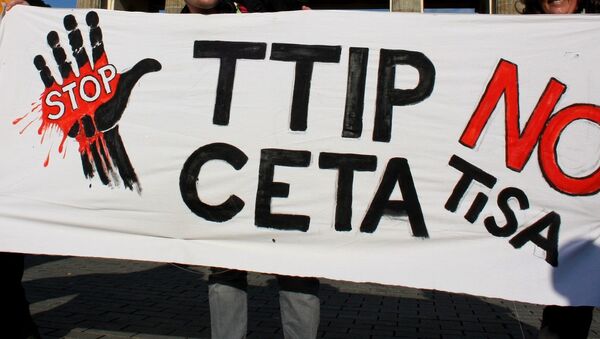The Trade in Services Agreement (TiSA) is a trade agreement currently being negotiated by 23 members of the World Trade Organization (WTO), including the EU. Together, the participating countries account for 70% of world trade in services.
#TTIP & #TPP may be dead. But they will live on through their big brother #TiSA https://t.co/gqyWldsWbJ #TPP
— WikiLeaks (@wikileaks) 29 August 2016
See https://t.co/mpLZQuBVYq
Unlike TTIP, TiSA is all about the provision of services and aims at opening up markets and improving rules in areas such as licensing, financial services, telecoms, e-commerce, maritime transport, and professionals moving abroad temporarily to provide services.
However, campaigners, including Global Justice Now, say the TiSA deal will lock in privatization of public services, will mean more "casino capitalism" because it will undermine efforts to regulate the financial sector and avoid another crisis and is also a threat to online privacy.
"This deal is a threat to the very concept of public services. It is a turbo-charged privatization pact, based on the idea that, rather than serving the public interest, governments must step out of the way and allow corporations to ‘get on with it,'" Nick Dearden the director of Global Justice Now told Sputnik.
"Of particular concern, we fear TiSA will include clauses that will prevent governments taking public control of strategic services, and inhibit regulation of the very banks that created the financial crash. TiSA will also affect countries that haven't even had the opportunity to develop decent public services like Pakistan. No wonder Uruguay has already walked away from the talks. We urge MEPs to tell the European Union to do the same."
#TISA the trade deal could be greater threat to public services than #TTIP
— Global Justice Now (@GlobalJusticeUK) 31 August 2016
Our new briefing https://t.co/bSNxAdFzcP pic.twitter.com/ifkrceqEui
Secrecy
The EU has admitted that the talks have been secretive, stating on its website that:
"Like any other trade negotiations, the TiSA talks are not carried out in public and the documents are available to participants only."
According to Global Justice Now, the main mechanism for this in the deal is what is called a "ratchet clause." Once a country has unilaterally liberalized a services sector — such as health or postal services — by giving foreign companies the same or better treatment than national ones, it cannot reverse that measure for companies from TiSA member states. This means that while no country will be forced to privatize a public service, once foreign companies are allowed in to provide a service, it becomes much more difficult to reverse.
#TTIP is dead. Now we're being told the big threat to democracy is called #TISA https://t.co/im76Hn3Lc0 via @MidWalesMike
— Quest4Truth (@VvsTyranny) 31 August 2016
Data protection regulation is also a controversial area. Big business wants more control of the Internet and flows of data.
Specifically, many US firms want to be able to move data across borders at will. This would allow companies like Google and Facebook to move personal information to the USA where data protection laws are far laxer than in the EU, according to Global Justice Now.




